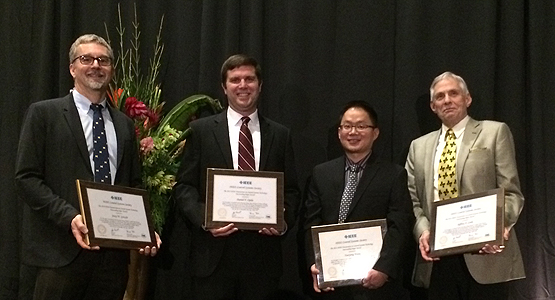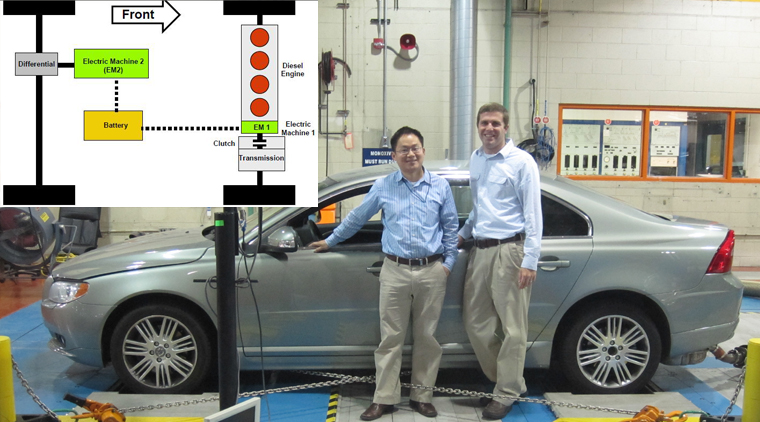HEV fuel economy meets drivability in Outstanding Control Systems Paper
The research aimed to find a happy medium between fuel economy and drivability in hybrid electric vehicles.

 Enlarge
Enlarge
Research that aims to find a happy medium between fuel economy and drivability in hybrid electric vehicles was recognized with the 2014 IEEE Transactions on Control Systems Technology (TCST) Outstanding Paper Award.
The research was directed by Prof. Jessy Grizzle, and published in TCST as, An Energy Management Controller to Optimally Trade Off Fuel Economy and Drivability for Hybrid Vehicles, by Daniel F. Opila, Xiaoyong Wang, Ryan McGee, R. Brent Gillespie, Jeffrey A. Cook, and Jessy W. Grizzle (vol 20, no. 5, November 2012).
Controlling the flow of energy in a hybrid electric vehicle (HEV), called energy management, is critical to achieving the superior fuel economy demanded by HEV owners. At the same time, owners want their vehicles to accelerate and brake smoothly and quickly (responsively), features known as “drivability.”
In the researchers attempt to quantify the tradeoffs between fuel economy and drivability in HEVs, the problem is made even more complex given the fact that HEVs have multiple energy sources, such as an internal combustion engine, a battery, and one or more electric machines. In addition, any solution will ideally take into account the diverse driving behaviors of HEV owners, ie, there is no single standard for drivability.

 Enlarge
Enlarge
The research team employed a process called shortest path stochastic dynamic programming (SP-SDP) to optimize both energy management and drivability in a Volvo S-80 test vehicle. As shown schematically in the above diagram, the HEV is a series-parallel electric hybrid. A 2.4 L diesel engine is coupled to the front axle through a dual clutch 6-speed transmission. An electric machine, EM1, is directly coupled to the engine crankshaft and can generate power regardless of clutch state. A second electric machine, EM2, is directly coupled to the rear axle through a fixed gear ratio without a clutch and always rotates at a speed proportional to vehicle speed. Energy is stored in a 1.5 kWh battery pack.
Using their own SP-SDP-based controllers, they achieved an 11% improvement in fuel efficiency over an industrial baseline controller, without sacrificing drivability. The algorithms developed by the researchers provide a systematic approach to the fuel economy vs. drivability dichotomy, removing much of the trial-and-error approach of previous solutions.
Real-world driving data was collected by the Michigan Transportation Research Institute, and the algorithms developed by the researchers have been evaluated on prototype Ford hybrid vehicles. Continued research has corroborated the original study, while taking into account an even broader array of real-world drive cycles and driving styles.

 Enlarge
Enlarge
Daniel Opila, first author on the paper, was a doctoral student working with Prof. Grizzle and Prof. Gillespie; he is now an Assistant Professor at the Naval Academy. Dr. Wang and Mr. McGee are Ford engineers, and Dr. Jeffrey Cook is a former engineer at Ford and current adjunct faculty member at Michigan.
Jessy Grizzle, the Jerry W. and Carol L. Levin Professor of Engineering and Elmer G. Gilbert Distinguished University Professor of Engineering, is an internationally renowned researcher in the area of control systems. In addition to his long-standing work with automobiles, his more recent work applying control theory to bipedal robots has led to worldwide recognition in this area.
This is the third award in the area of automotive fuel-efficiency earned by the team of Prof. Grizzle and Dr. Cook. They received the 1992 Vehicular Electronics Paper of the Year Award for Individual Cylinder Air-Fuel Ratio Control with a Single EGO Sensor, with Kevin L. Dobbins, and the 2003 Control Systems Technology Award of the IEEE Control Systems Society for the development of fuel-efficient and environmentally friendly automotive powertrains through innovative application of control theory, with U-M Prof. Jing Sun.
The award was presented at the IEEE Conference on Decision and Control (CDC), December 16, 2014.
About the Award
The IEEE Transactions on Control Systems Technology (TCST) Outstanding Paper Award is given annually to recognize an outstanding paper published in the IEEE Transactions on Control Systems Technology (TCST) during the past two years. Papers are judged on originality, relevance of the application, clarity of exposition, and demonstrated impact on control systems technology.
 MENU
MENU 
